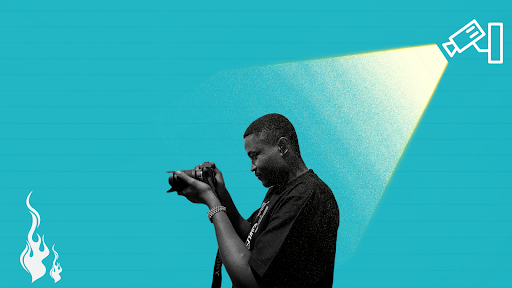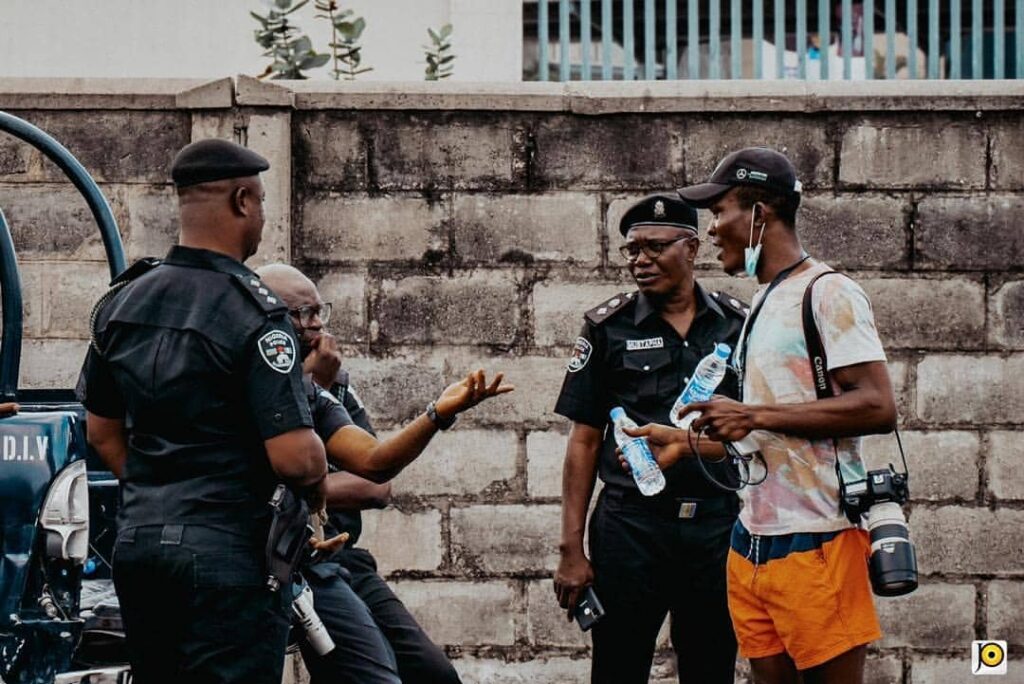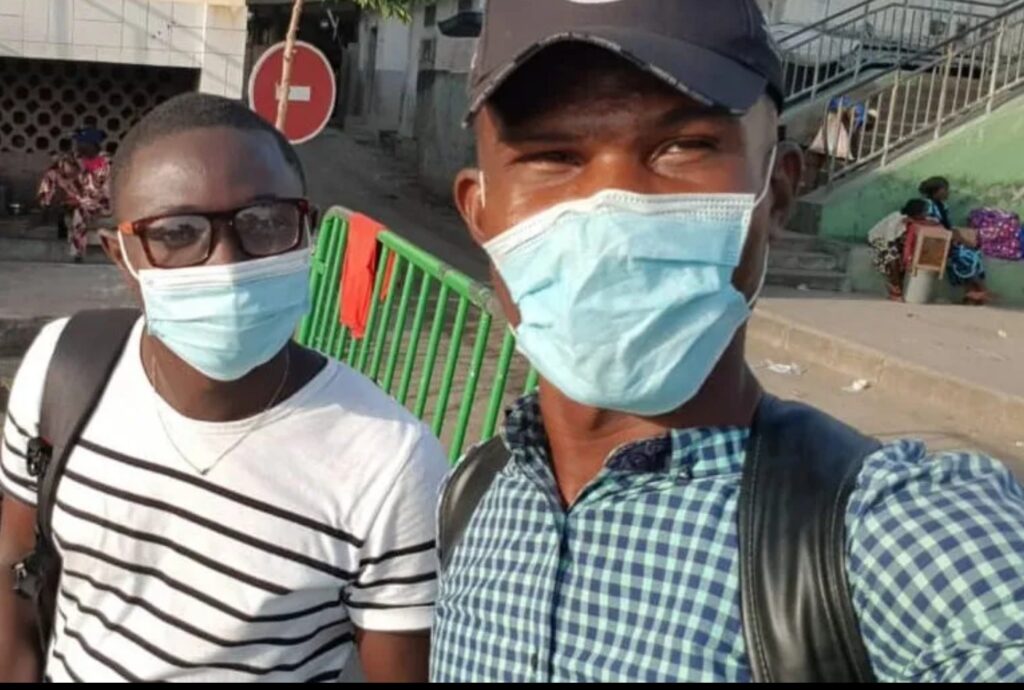How Digital Surveillance Threatens Press Freedom In West Africa
State agents in various West African countries are exploiting weak laws and employing advanced technology to spy on and harass journalists.

When Eti-Inyene Akpan, a freelance photojournalist, heard about the plans to hold #EndSARS protests in Oct. 2020, he was eager to be at the forefront of reporting activities. He was going to document the events as Nigeria’s young people expressed displeasure over abuses by officers of the police Special Anti-Robbery Squad (SARS). He would take photos of the demonstrations and share them on social media to create awareness.
Akpan himself was a victim of police brutality in 2015 when he was still an undergraduate at the University of Benin. He was ambushed by cultists for refusing to be part of them. When passersby intervened, the cultists accused him of being a thief.
“Unfortunately, there was a recent robbery incident in the area at the time. So, I was handed over to the police, who had caught one of the robbers disturbing the community the night before. On getting to the station, the guy caught said he did not know me. In spite of that, I was locked up for more than a week without being arraigned.”
His parents had to pay a huge sum before he was released. Afterwards, Akpan said, the police officer who extorted them admitted knowing he was attacked by cultists, adding that they could not guarantee his safety in the area. He had to leave Benin without completing his five-year pharmaceutical programme.
“From my past experience, I could relate to the feelings of many Nigerians. So, I was there all day to tell stories of the protesters.”
On Oct. 20, 2020, in an attempt to bring an end to the protests, the Nigerian government deployed soldiers to the Lekki tollgate in Lagos, which had one of the largest gatherings of protesters. The troops shot at unarmed protesters and killed at least nine people. Others are still ‘missing’.
Akpan, who was present at the scene, took several pictures and videos of people soaked in blood. The same evening, he uploaded his pictures on Instagram. “Right in front of my eyes, I saw dead bodies. I had to narrowly escape. Here are some of the pictures of those […] shot by bullets. Let today’s date be marked in history books. Our government has failed us,” he wrote in the caption. In another post, he said with picture evidence: “Even when the peaceful protesters raised the Nigerian flag, they still shot at them.”
He would later tell HumAngle it was his first time seeing “raw bullet wounds”.
The following morning, federal authorities denied shooting at protesters. Since his pictures contradicted the official account, particularly Minister of Information and Culture Lai Mohammed who described the incident as a “phantom massacre without blood or bodies”, Akpan started receiving calls from unknown contacts, asking him to pull down his posts.
“I was pressured by those calling as they asked me to delete my post and also told me to lie to the world that the pictures were fake.”
Soon, his bank account was frozen and personnel of the domestic intelligence agency, DSS, visited his office to look for him.

Akpan heeded his friends’ advice and left the country.
“They (security operatives) were already visiting the homes of my relatives to look for me. With the help of the Committee to Protect Journalists (CPJ), I embarked on a journey of hundreds of miles to Ghana through the Benin Republic and Togo,” he recalled.
“I have two sisters, but I told them not to tell my mother because she’s hypertensive. A week later, my sister called to tell me it seemed my mother knew already. I put her through a lot of trauma.”
Surviving in exile would have been difficult for Akpan. He knew no one, whether in Benin or Togo, and did not speak the languages. But CPJ linked him with two local investigative journalists — Ignace Sossou in Benin and Ferdinand Ayité in Togo.
Sossou offered to help because he had also faced similar attacks from authorities in Benin in 2019. He had, in a Facebook post, quoted Beninese Public Prosecutor Mario Mètonou as describing the country’s digital code as “a weapon” that could be used against the press. He would later be jailed for six months.

The surveillance of journalists by government agencies is a widespread practice in West Africa.
Aside from Sossou, the Beninoise police in 2019 raided the home of Casimir Kpedjo, editor of the Nouvelle Economie online newspaper, seized his computer, scanned its content, and copied data from the device, before arresting him. Two other journalists, Patrice Gbaguidi and Hervé Alladé, were sentenced in Nov. 2021 over accusations that they violated the country’s digital code by sharing their report about a public official’s alleged wrongdoing on social media. Amnesty International says Benin’s digital code, is being used to gag press freedom.
In Ghana, authorities are using cybercrime laws to treat journalists as criminals. It’s one of the countries where the military-grade cyber-surveillance system, Pegasus, has been used to spy on the private communications of individuals. It is also believed to have received phone-hacking equipment from foreign governments in 2019.
“It can copy messages you send or receive, harvest your photos and record your calls. It might secretly film you through your phone’s camera, or activate the microphone to record your conversations. It can potentially pinpoint where you are, where you’ve been, and who you’ve met,” The Guardian said about Pegasus in 2021.
The software is marketed and licensed to governments around the world under the guise of protecting national security and public safety.
According to Muhammed Bah, president of Gambia Press Union, journalists in the country work under the threat of digital surveillance due to the existence of a legal and technological framework that emboldens security agencies. Article 138 of the Gambia Information Communications Act gives national security agencies and investigative authorities the power to monitor, intercept, and store communications for surveillance purposes without effective judicial oversight.
The situation is the same in Guinea, where authorities have in the past arrested and seized journalists’ equipment. Even when the journalists were freed, their laptops which had several critical investigative materials were not returned to them. In Mali, authorities are also using digital surveillance tools to make journalism practice difficult for media practitioners.
Also, the authorities in Senegal have justified new laws that allow them to monitor citizen communication by saying they exist for the country’s security, but some journalists have raised concerns about this decision. The situation is the same in Togo as three journalists, in 2021, discovered that their phones were targeted for spyware surveillance long before they were arrested.
In 2019, Nigerian military personnel seized phones and computers from the offices of Daily Trust in Abuja and Maiduguri and subjected the devices to forensic search in a likely attempt to uncover the paper’s sources.
The following year, it was revealed that Nigeria’s Defence Intelligence Agency (DIA) has since 2015 acquired equipment to spy on phone conversations. The DIA reportedly bought the equipment from Circles, a surveillance firm that exploits weaknesses in the global mobile phone system to snoop on calls, texts, and the location of phones.
Nigeria has invested heavily in the acquisition of surveillance equipment for its security agencies since at least 2014 and oftentimes, journalists are targeted with this technology.
The police arrested Gidado Shuiab and Alfred Olufemi in 2019 over a News Digest report. They are believed to have bugged the phone of a former News Digest employee, Adebowale Adekoya, and then traced him to Yusuf Yunus and Wunmi Ashafa, two Lagos-based journalists. The police claimed they were investigating a fraud. So, they tricked them into setting up meetings that facilitated Adekoya’s arrest.
The police, who told Adekoya that they have been tracking his calls and SMS messages for a while, later forced him to lead them to Shuaib’s Abuja residence. Eventually, they also arrested Olufemi. The article’s authors were subsequently charged with criminal conspiracy and defamation.
The same tactic was used to arrest Fejiro Oliver, the publisher of the privately owned Secret Reporters, in 2017. According to a memoir on his Facebook page, the police lured him through Prince Kpokpogri, an acquaintance he was frequently in touch with on the phone.
HumAngle reached out to Jimmy Akpor, spokesperson of the defence headquarters, for comments, but he did not respond to calls and texts. Our reporters encountered the same challenge with DSS spokesperson Peter Afunanya.

Sometimes, such surveillance is backed by law or enabled by gaps in the country’s legal framework. In Nigeria, for example, the constitution guarantees citizens’ right to privacy and empowers the press to hold the government accountable. But there are other laws making it possible for the government to obtain personal information for various reasons.
The Nigerian Communications Act mandates network service providers to assist authorities in preventing crime and protecting national security. The Cybercrime Act additionally empowers law enforcement agents to get subscriber information from service providers. With the help of a court order, they can also intercept electronic communication for a criminal investigation. The law adds that any data retrieved through these methods must be used legitimately, but this isn’t always what happens.
Civil society groups have tried for many years to pass a Digital Rights and Freedom Bill, which protects Nigerians’ rights to digital privacy and other internet freedoms. But President Muhammadu Buhari declined to sign the legislation in 2019, citing “technical reasons”. Efforts have resumed to get a revised version of the bill passed before the current administration hands over power.
When contacted about access to user data by security agencies, the public relations units of Glo, MTN, 9mobile, and Airtel did not respond to HumAngle’s enquiries.

The United Nations has described the widespread use of spyware on journalists as extremely alarming.
“Use of surveillance software has been linked to arrest, intimidation and even killings of journalists and human rights defenders. Reports of surveillance also have the invidious effect of making people censor themselves through fear. Journalists and human rights defenders play an indispensable role in our societies, and when they are silenced, we all suffer,” noted Michelle Bachelet, former UN High Commissioner for Human Rights.
CPJ has also urged authorities to desist from the misuse of spyware to threaten press freedom.
___________________________
Akpan’s exile was difficult. Survival was hard and his mental health was dealt a blow, especially until a friend in Ghana eventually offered him accommodation. He finally returned to Nigeria in Feb. 2021. He told HumAngle this was because he felt there was more work to do to tell the stories of the End SARS protesters.
“I got back and felt bad about my mother’s health. It wouldn’t have gone that bad if I had been home. That was the most painful thing for me,” he said.
He spent most of his time planning a photo exhibition for the protest anniversary. But his ordeal with state agents was not over. He couldn’t go back to his office. After granting a live television interview about his work, he received calls from the DSS, summoning him to their office without an explanation. He replied that he would honour an emailed invitation.
“There were times I got some calls for job offers and when I checked the names of the companies, I realised that they do not exist. I was surprised at how they got my contact till I was forced to postpone the exhibition indefinitely,” he said.
“Till now, I’m scared because you cannot predict the Nigerian government. I still don’t tell people my whereabouts and it’s been really bad as I only sleep with one eye closed.”
The report is supported by the Centre for Journalism and Innovation and Development (CJID) in partnership with the Justice for Journalists Foundation.
Support Our Journalism
There are millions of ordinary people affected by conflict in Africa whose stories are missing in the mainstream media. HumAngle is determined to tell those challenging and under-reported stories, hoping that the people impacted by these conflicts will find the safety and security they deserve.
To ensure that we continue to provide public service coverage, we have a small favour to ask you. We want you to be part of our journalistic endeavour by contributing a token to us.
Your donation will further promote a robust, free, and independent media.
Donate HereStay Closer To The Stories That Matter




